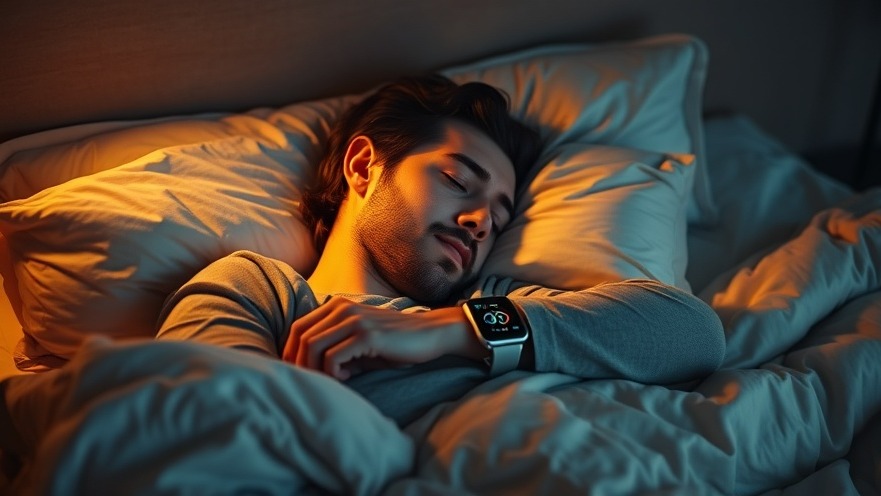
The Rise of Sleep Trackers: An Overview
In today's health-conscious society, many individuals harness the power of technology to monitor and enhance their well-being, and sleep is no exception. Wearable devices such as smartwatches and fitness trackers have integrated sleep tracking capabilities, which promise to provide users with insights into their sleep patterns and quality. This innovation raises an important question: How do sleep trackers work, and are they truly beneficial to users, particularly healthcare practitioners and their patients?
Understanding Sleep Measurement: The Gold Standard
To appreciate the advancements made in sleep tracking technology, it’s essential to discuss the traditional method of sleep measurement known as polysomnography (PSG). This comprehensive test involves attaching multiple sensors to the body, measuring various physiological signals such as brain activity, eye movements, heart rate, and muscle tone. While PSG offers accurate insights, it is cumbersome and impractical for daily use, making wearables a convenient alternative.
The Technology Behind Wearable Sleep Trackers
Modern wearable sleep trackers rely on a combination of technologies to offer insights about sleep. Among these technologies, accelerometers serve a crucial role; they detect movement and determine sleep patterns based on activity levels. However, this method can inaccurately classify periods of stillness, like quietly reading, as sleep, leading to erroneous data.
A breakthrough in sleep monitoring came with the introduction of photoplethysmography (PPG). This technology uses light sensors to measure blood volume changes in microvascular tissues, primarily to monitor heart rate and respiratory rate. By combining PPG data with motion analysis, sleep trackers can better estimate sleep stages accurately, enhancing their utility beyond simple movement tracking.
Evaluating the Accuracy of Sleep Trackers
When assessing whether sleep trackers are beneficial for patients, accuracy becomes the focal point. Studies comparing consumer-grade wearables with the gold standard of PSG suggest a variable level of accuracy, particularly in identifying sleep stages. While the trackers may accurately estimate total sleep duration, they often struggle with discerning between light and deep sleep stages.
For healthcare practitioners, it’s crucial to select a device that aligns with clinical needs. Some wearables are designed with medical accuracy in mind, providing reliable data that practitioners can use to support treatment plans. This offers a dual advantage: empowering patients through engagement in their health while equipping practitioners with pertinent data.
Trends in Sleep Health: Implications for Patients
The increased adoption of sleep trackers presents a trend toward personalized healthcare. Patients are becoming proactive participants in managing their sleep, utilizing data to make informed changes to their routines. For health practitioners, these devices can enhance the patient-practitioner dialogue, as they provide tangible metrics for discussion during consultations.
Addressing Limitations: A Balanced Perspective
While the benefits of sleep trackers are significant, they are not without limitations. Patients should be aware that sleep trackers can misinterpret data, leading to unnecessary anxiety or misinformed self-diagnosis. This underscores the importance of maintaining a critical perspective on the data provided by such devices.
Moreover, education is paramount. Health practitioners play a key role in guiding patients on the appropriate use of sleep trackers, emphasizing their role as supplemental tools rather than definitive diagnostic devices.
Practical Applications for Health Practitioners
For concierge health practitioners, the adoption of sleep tracking technology can enhance patient care significantly. Patients' sleep metrics can inform treatment options for conditions like insomnia or sleep apnea, allowing for more tailored interventions. Furthermore, by promoting healthy sleep practices, practitioners can directly influence their patients' overall wellness.
The Future of Sleep Tracking Technology
As technology advances, the future of sleep tracking promises further enhancements in accuracy and functionality. Emerging technologies such as artificial intelligence could potentially allow for more detailed analysis and understanding of sleep patterns, paving the way for innovations in sleep health.
Conclusion: The Value of Sleep Trackers
To sum up, sleep trackers present an exciting opportunity for both patients and health practitioners. While they come with limitations, their ability to provide insights into sleep behaviors can transform the landscape of patient care. With the growth of personalized healthcare, these devices may soon become invaluable tools integrated into holistic treatment frameworks.
 Add Row
Add Row  Add
Add 




Write A Comment